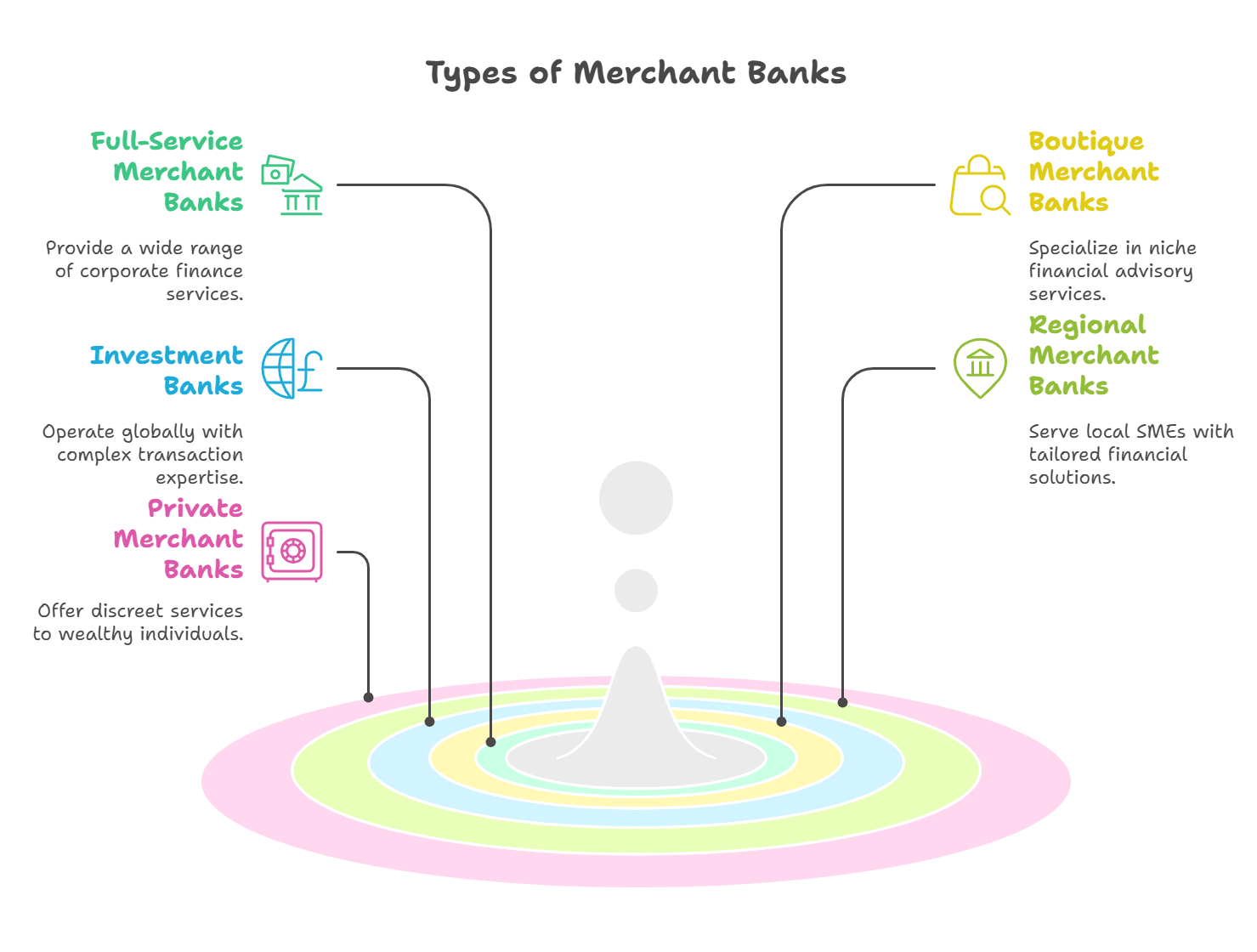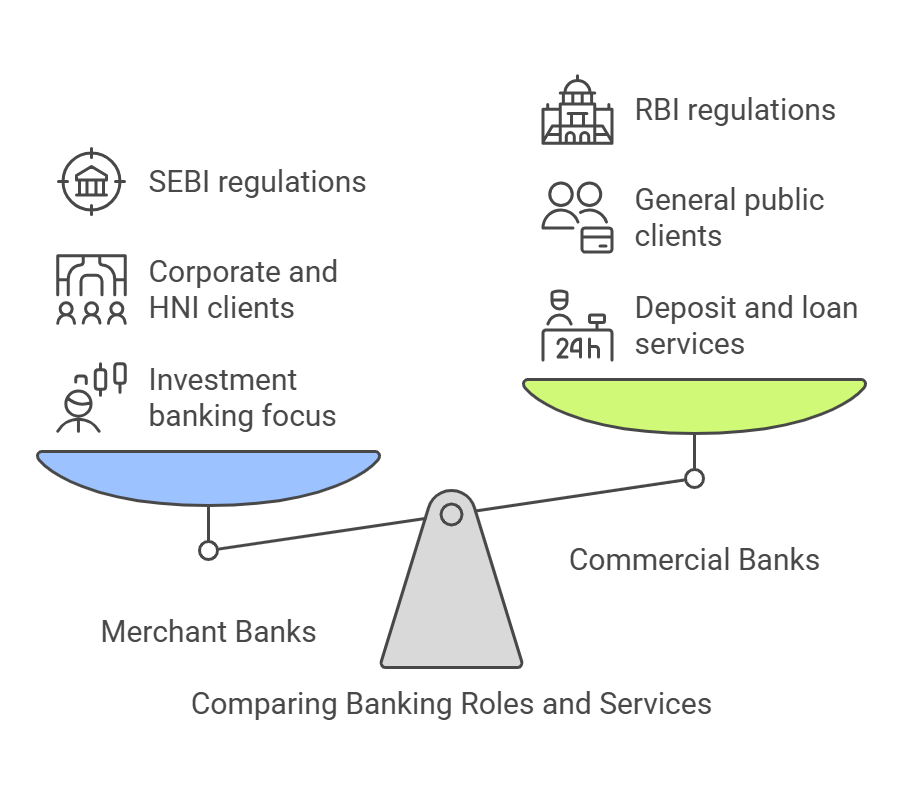Merchant Bank: role and types
Introduction to Merchant Banking
Merchant banking refers to specialized financial services that assist companies with various financial activities, such as raising capital, providing financial advisory services, facilitating mergers and acquisitions, and managing investments. Unlike commercial banks that focus on traditional banking services like accepting deposits and providing loans, merchant banks concentrate on corporate finance and advisory functions.
In India, merchant banks are regulated by the Securities and Exchange Board of India (SEBI), and they play a crucial role in the efficient functioning of the primary and secondary markets.
Role of Merchant Banks
Merchant banks perform several key functions in the financial system:
-
Issue Management:
- Assist companies in raising capital through various methods, including Initial Public Offerings (IPOs), Follow-on Public Offerings (FPOs), Rights Issues, and Private Placements.
- Help prepare essential documents like prospectuses, determine pricing strategies, and ensure compliance with regulatory filings required by SEBI.
- Manage the entire issue process, coordinating with underwriters, registrars, and bankers to ensure a smooth and successful offering.
-
Underwriting of Securities:
- Act as intermediaries between companies issuing securities and investors, guaranteeing the sale of shares or bonds.
- Underwriting helps to reduce the risk for issuing companies, as the merchant bank commits to purchasing any securities that are not subscribed by the public.
- Enhances investor confidence by providing an assurance that the issue will be fully subscribed.
-
Mergers & Acquisitions (M&A) Advisory:
- Provide comprehensive advisory services for companies involved in mergers, acquisitions, and takeovers.
- Conduct due diligence to assess the financial health and strategic fit of target companies.
- Offer valuation services to determine fair prices for transactions.
- Provide negotiation support to help clients achieve favorable terms.
-
Project Finance and Loan Syndication:
- Arrange funding for large-scale infrastructure projects, industrial expansion, and new ventures.
- Structure financing deals that meet the specific needs of the project and the investors.
- Coordinate with multiple financial institutions to syndicate loans, spreading the risk and enabling access to larger amounts of capital.
-
Portfolio Management Services (PMS):
- Provide investment strategies, risk management services, and portfolio diversification for institutional investors and high-net-worth individuals (HNIs).
- Manage investment portfolios on behalf of clients, aiming to achieve specific investment goals.
-
Foreign Investment Advisory:
- Assist companies in attracting Foreign Direct Investment (FDI) and Foreign Portfolio Investment (FPI).
- Provide guidance on regulatory compliance related to RBI (Reserve Bank of India), FEMA (Foreign Exchange Management Act), and SEBI guidelines.
- Facilitate cross-border transactions and help companies navigate the complexities of international finance.
-
Venture Capital & Private Equity Advisory:
- Help startups and growing businesses secure venture capital and private equity funding.
- Structure investment deals to align the interests of investors and entrepreneurs.
- Provide financial guidance and mentorship to emerging businesses.
Types of Merchant Banks:
Merchant banks can be classified into several types based on the scope of their services, their clientele, and their geographic reach:
-
Full-Service Merchant Banks:
- Offer a comprehensive suite of financial services, including issue management, underwriting, mergers & acquisitions advisory, and investment advisory.
- Example: ICICI Securities, Kotak Mahindra Capital.
-
Boutique Merchant Banks:
- Specialize in specific areas of finance, such as M&A advisory, private equity placements, or debt restructuring.
- Often focus on niche markets and provide highly specialized expertise.
- Example: Avendus Capital, Equirus Capital.
-
Investment Banks (Global Merchant Banks):
- Operate on a global scale and provide high-end corporate finance services to multinational corporations and large institutional investors.
- Offer expertise in complex transactions, cross-border deals, and global capital markets.
- Example: Goldman Sachs, Morgan Stanley.
-
Regional Merchant Banks:
- Cater to small and medium enterprises (SMEs) and regional businesses, providing financial services tailored to their specific needs.
- Often have strong local market knowledge and relationships.
- Example: SME-focused investment banks like Pantomath Capital.
-
Private Merchant Banks:
Difference Between Merchant Banks and Commercial Banks:
| Feature | Merchant Banks | Commercial Banks |
|---|---|---|
| Function | Investment banking & advisory (capital raising, M&A, investment management) | Accept deposits, provide loans, offer transactional services |
| Clients | Corporates, high-net-worth individuals (HNIs), institutional investors | General public, businesses of all sizes |
| Services | IPOs, M&As, underwriting, FDI advisory, portfolio management | Savings accounts, loans, credit cards, payments processing |
| Regulations | SEBI (Securities and Exchange Board of India) | RBI (Reserve Bank of India) |
| Example | Kotak Investment Banking, JM Financial | State Bank of India (SBI), HDFC Bank, ICICI Bank |
Conclusion:
Merchant banks are essential for corporate financial structuring, capital raising, and investment advisory. They bridge the gap between companies and investors, ensuring the smooth flow of capital in the financial system. By providing specialized expertise and tailored solutions, merchant banks contribute to economic growth and the development of vibrant capital markets.




No Comments